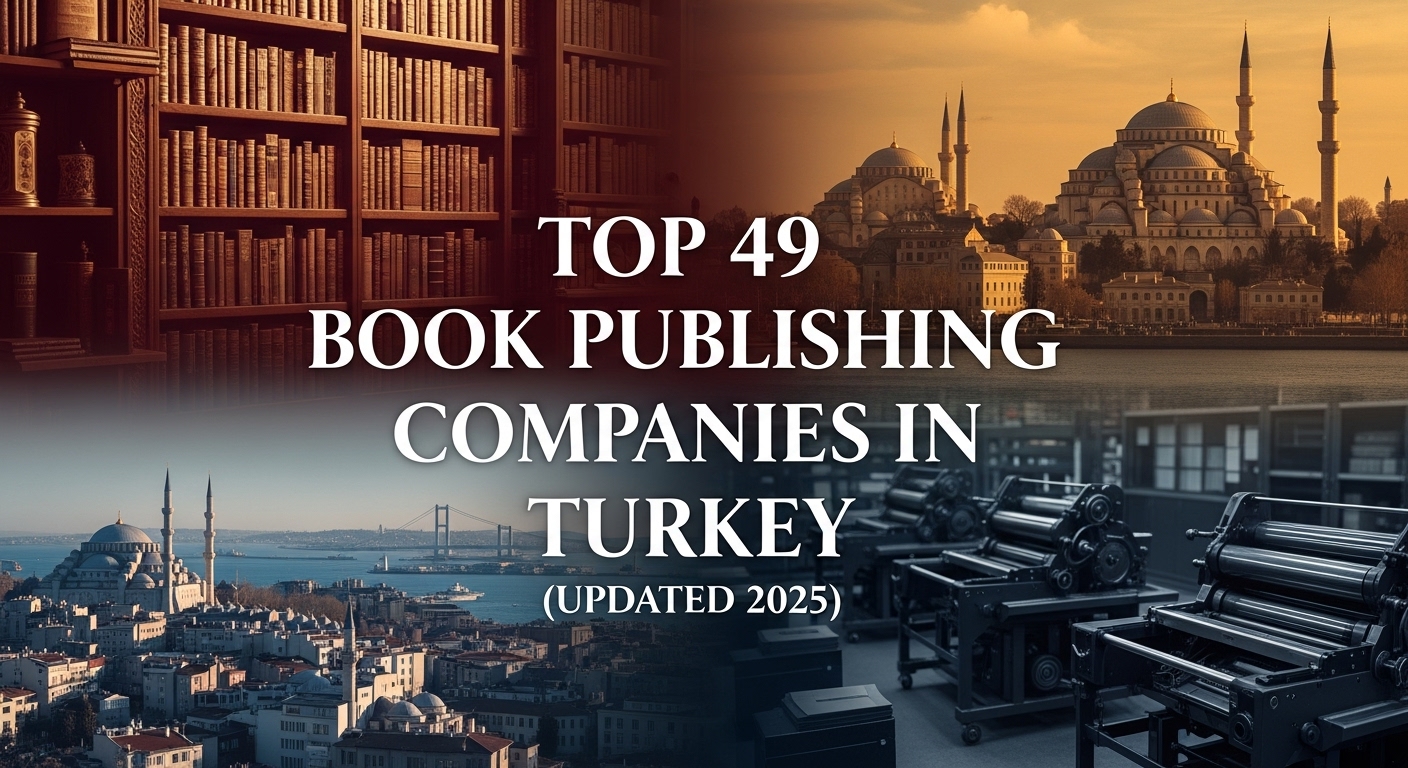
Turkey’s publishing industry has grown steadily over the past decade, blending a rich literary tradition with increasing commercial reach. Whether you’re an aspiring novelist, an academic, or a children’s book author, Turkey offers a wide range of publishers — from large international-minded houses to niche independent presses..
1. Barnett Ghostwriting
Barnett is included first as a bridge service that many Turkish and international authors use to polish manuscripts, prepare proposals, and navigate submission and self-publishing options in Turkey. While not a conventional house, Barnett Ghostwriting offers a mix of key benefits:
- Development Editing: Detailed editorial feedback to strengthen structure, pacing, and style.
- Book Proposal Support: Assistance in creating professional proposals tailored to the Turkish and international markets.
- Publishing Connections: Access to a network of literary agents, translators, and publishing houses.
- Self-Publishing Guidance: Step-by-step support for authors choosing an independent route.
This combination of editorial rigor and targeted publishing guidance makes Barnett a practical first stop for authors who want to improve their manuscript’s marketability before approaching traditional or hybrid publishers.
2. Can Yayınları
A major literary publisher known for high editorial standards and a strong list of contemporary Turkish and translated literature.
3. Doğan Kitap
One of Turkey’s largest publishers, offering a wide catalogue including fiction, non-fiction, business, and children’s books. Broad distribution and strong marketing support.
4. İletişim Yayınları
Known for intellectual non-fiction, essays, and literary works. Respected for academic quality and cultural titles.
5. Yapı Kredi Yayınları
A prestigious press with a long history, producing literature, humanities, and art books; often associated with curated translations.
6. Remzi Kitabevi
An established publisher and bookseller with a varied list that includes both mainstream and literary titles.
7. Everest Yayınları
Focused on non-fiction, history, and cultural studies, Everest has a loyal readership for thoughtful, well-researched titles.
8. Metis Yayınları
A vibrant independent publisher that champions progressive fiction and contemporary social commentary.
9. Doğu Batı Yayınları
Specializes in academic and cultural works, with a strong presence in humanities publishing.
10. Kırmızı Kedi Yayınları
Noted for children’s books and literary fiction, Kırmızı Kedi has gained popularity for quality design and translation choices.
11. İthaki Yayınları
A leader in genre fiction — especially science fiction, fantasy, and popular translated works.
12. Alfa Yayınları
Known for practical non-fiction, self-help, and business titles, Alfa has broad distribution channels.
13. Altın Kitaplar
A mainstream publisher with a large backlist and strong retail presence throughout Turkey.
14. Pegasus Yayınları
Active in translated fiction and popular contemporary authors; known for timely acquisitions.
15. Sarmal Yayınevi
A boutique publisher focusing on poetry, experimental fiction, and artist books.
16. İnkılâp Kitabevi
With roots in academic and educational publishing, İnkılâp also publishes general interest non-fiction.
17. Canbaz Yayınları
An independent house that highlights marginalized voices and regional authors.
18. Sel Yayıncılık
A distinguished list of contemporary literary fiction and cultural non-fiction.
19. Turkuvaz Kitap
Part of a media group with strong marketing muscle, Turkuvaz publishes commercial bestsellers and celebrity titles.
20. Nobel Yayınları
Focused on educational and popular science titles, Nobel has a strong presence in schools and universities.
21. İletişim Bilim Yayınları
An imprint specializing in social science and academic works; often used by scholars and researchers.
22. Yapı Kredi Çocuk
Yapı Kredi’s children’s imprint — recognized for beautifully produced kids’ books and picture books.
23. İmge Kitabevi
Known for scholarly works and critical theory; a go-to for intellectual readers.
24. Aylak Adam Yayınları
An independent press championing contemporary poetry and short fiction.
25. Canik Yayınları
A regional-oriented publisher that supports local authors and cultural projects.
26. Broy Yayınları
Specializes in art, photography books, and high-quality illustrated publications.
27. İletişim Gençlik
A subdivision aimed at YA and young readers, publishing both translations and original Turkish YA fiction.
28. Ötüken Neşriyat
Focused on history, culture, and regional studies with an emphasis on well-researched non-fiction.
29. Varlık Yayınları
One of the oldest literary publishers in Turkey, Varlık is synonymous with poetry and classic Turkish literature.
30. İnkılâp Akademi
An imprint emphasizing academic textbooks and professional development titles.
31. Ayrıntı Yayınları
Renowned for literary translation, essays, and cultural criticism. It maintains a discerning editorial voice.
32. İmajin Yayıncılık
A small but influential house that often discovers experimental writers and new voices.
33. Can Avrupa
An imprint concentrating on European literature and translations.
34. Gerçek Yayınları
A firm with a broad catalogue including memoirs, biographies, and social critique.
35. İş Bankası Kültür Yayınları
The publishing arm of İş Bankası, known for high-quality non-fiction, history, and economics titles.
36. Aras Yayıncılık
A publisher with a focus on press freedom, human rights, and socially engaged literature.
37. Özgür Yayınları
An independent house supporting avant-garde, radical, and politically engaged works.
38. Dergah Yayınları
Noted for philosophy, religious studies, and deep cultural analysis.
39. Notos Yayınları
A publisher tied to the literary magazine of the same name; focused on contemporary fiction.
40. Yapı Kredi Yayınları – Akademi
Yapı Kredi’s academic imprint for humanities and scholarly monographs.
41. İthaki Çocuk
Children’s and YA imprint of İthaki, publishing imaginative and genre-bending titles for younger readers.
42. Timaş Yayınları
A commercial publisher with a wide-ranging catalogue, including translations and lifestyle titles.
43. Can Çocuk
A highly respected children’s publisher with classic picture books and educational series.
44. Kastaş Yayınları
A boutique press focused on artisanal bookmaking, poetry, and limited editions.
45. Alfa Çocuk
Alfa’s children’s division with practical and activity-based titles for younger age groups.
46. Siyah Beyaz Yayınları
A design-forward publisher focusing on art books, photography, and cultural volumes.
47. Ayrıntı Akademi
Imprint dedicated to scholarly translations and academic monographs.
48. İnkılâp Çocuk
Educational and children’s titles from İnkılâp with an emphasis on school-friendly formats.
49. Damla Yayınevi
A smaller regional press with a focus on local culture, folklore, and children’s storytelling.
How to choose the right Turkish publisher for your book
Consider genre fit first: large houses often prefer commercial or broadly appealing titles, while independents are more open to experimental work. Evaluate distribution reach — some publishers have nationwide chains and export pipelines, while boutique presses may limit print runs but provide stronger editorial attention. Check recent publishing lists and reviews, ask about rights and translation options, and seek references from authors who worked with the publisher.
Benefits of working with established Turkish publishers
Established houses offer professional editing, design, print quality, and often a marketing budget. They can help place your book in national retailers, secure reviews, and — for translated works — navigate permission and rights management.
Costs & common service offerings (basic ranges, 2025)
- Traditional publishing: usually no upfront cost to the author; publishers cover editing, design, printing, and distribution in exchange for royalties (typical royalty ranges vary by contract).
- Hybrid or assisted publishing services: fees can range from modest packages (a few hundred USD) to full-service packages (several thousand USD) depending on editing, design, and distribution services.
- Translation and foreign rights: may incur advance or revenue-sharing agreements; authors should negotiate clear terms.
Practical tips for submitting to Turkish publishers
- Translate or prepare a Turkish-language synopsis if your manuscript is in another language.
- Follow each publisher’s submission guidelines exactly — many reject unsolicited full manuscripts without a query letter.
- Prepare a concise proposal: one-paragraph hook, brief synopsis, target audience, comparable titles, and a short author bio.
- If you need editorial help, consider development editing from reputable services (such as Barnett) before submission.
Frequently Asked Questions
Q: Do I need to speak Turkish to get published in Turkey?
A: Not always — translations and English-language imprints exist, but having a Turkish synopsis and a reliable translator improves your chances.
Q: How long does the process take?
A: From acceptance to publication: typically 6–18 months depending on the house and production schedule.
Q: Will a Turkish publisher handle foreign distribution?
A: Larger houses often sell translation rights and have foreign partners; smaller presses might not.
Q: Are self-publishing platforms popular in Turkey?
A: Yes — hybrid models and independent print-on-demand services are growing, offering an alternative to traditional routes.
Q: How do royalties work in Turkey?
A: Royalties vary; always review contracts carefully and consider negotiating advances,





